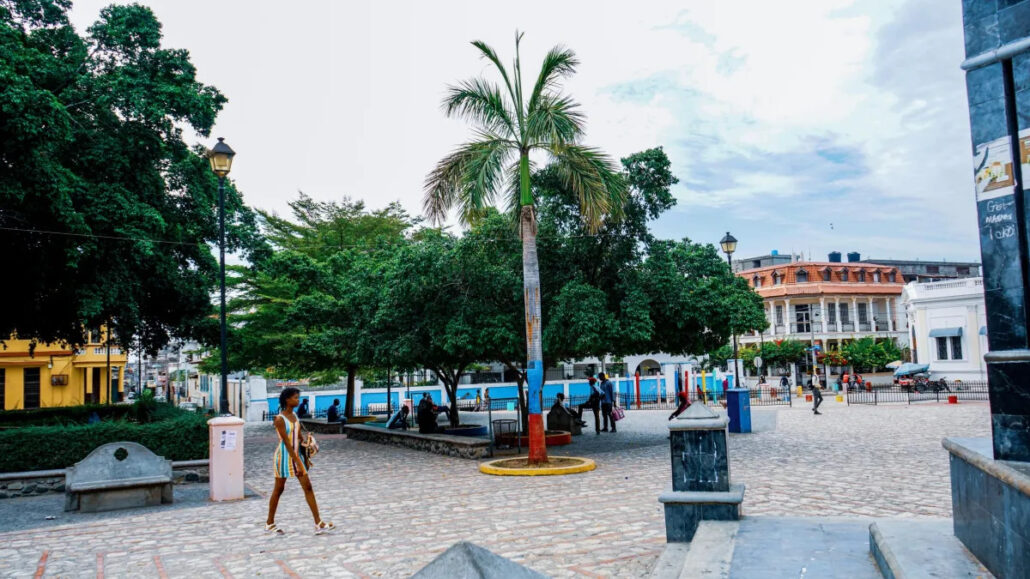www.haitiantimes.com
By Onz Chery

CAP-HAITIEN — To D’jerby Raphaël, a medical student based in Port-au-Prince, Haiti is just a place where people live — not a real country — since the state is not able to govern.
“Pa gen leta,” he said in Creole, a phrase often heard around Haiti. “There is no state.”
The last president who tried to govern Haiti, Jovenel Moïse, was shot dead 12 times inside his home in July 2021. Now, Acting Prime Minister Ariel Henry is giving it a try — with little success. Between the ongoing violence and other crises like the high cost of living, Haiti is deteriorating on Henry’s watch.
The one-year anniversary of Moise’s murder has prompted many an expert in geopolitics, diplomacy and statehood to offer numerous solutions for Haiti. Solutions that take into account the complexity of various stakeholders, including current officeholders and international allies, Haiti’s history and its place in the world.
But to some ordinary Haitians, the country just needs a hard reset. Tired of seeing the country fall apart, Raphaël and many others are calling for another revolution for Haiti that’s less about koupe tét boule kay and more about shaping the character of the 218-year-old nation.
“There’s no other solution, but a revolution,” Raphaël said. “A revolution in which Haitians get together and make a plan to change the order of things, to redefine the state, everything. Basically, this is a country that’s finished.”
A modern-day revolt to reset Haitian mindsets
Since the country’s birth in 1804, Haitians have long resorted to overthrowing the head of state to demand a better life. But the coups d’état often led to the country falling deeper into crisis because after replacing the heads of state, the country was still operating under the same system. So instead of going through this revolving door, some have begun suggesting a complete do-over, a second revolution out of which a new society can be formed.
At least one group has tried to start what is called a revolution in Haiti. In June 2021, the G9 Family and Allies gang, an armed group suspected in countless crimes, began calling itself the Force Revolution G9. Its leader Jimmy “Barbecue” Chérizier said it aimed to rid the country of the business and political elites, according to Reuters.
It was not successful. One reason being the group’s origin in criminality, which made many Haitians question the credibility of its motives.
Ordinary residents like Raphaël recognize they do not have the details of how this second revolution would take place. But they know the type of revolution they do want — one that would bring about laws, policies, rules and regulations, including law and order, to make life in Haiti livable.
“If we don’t have it, the country will remain how it is,” said Casseus Nixon, 39, an agricultural technician based in Anse-à-Pitres, a commune in the Southeastern Department. “Given how things are going in this country, I’m not seeing any progress.”
Nixon went further to say the policies should establish governmental control of the ports and no more than two political parties in an election.
“There are two many political parties, that’s what’s behind the political crisis,” he said. “If they had controlled the ports, all those guns wouldn’t have come into Haiti.”
Raphaël wishes to see a revolution of the education system.
“Young Haitians must know their country,” Raphaël said. “They have to teach them how to love their country in school starting with the kids. They have to know how to be patriotic. That education will make us think differently, so we will act differently.”
But even proponents like Raphaël admit it would be hard for Haitians to unite to start a new revolution. For starters, they would have to “forgive the wrongdoings they have done to each other,” he said.
Diana Ladouceur, a medical student based in Port-au-Prince, also wants to see an education-based revolution.
“There has to be a change in how we think,” Ladouceur said. “If the governments we’ve had haven’t come up with the solution, we must think about the people. What’s not working in our education system? Is it our way of life?”
Harmony and an overflowing vase
Ladouceur added that leaders in various sectors across the country must work in harmony to overthrow Henry for that turnaround to begin, though not by holding any more protest marches, the go-to step for nearly everyone dissatisfied with their life and work.
“Protests in Haiti don’t lead to anything,” Ladouceur said. “We’ve been protesting for too long. If you keep doing something and you don’t see results, I think there’s another way you can go about it.”
Last week, as the one-year mark of Moise’s assassination dawned, some Haitians also took to social media to advocate for a second revolution.
“The sovereign people of Haiti are the only ones who can take the lead and trigger a second revolution,” a Twitter user going by Dan Mechanic said on Jul. 5. “Bandits kill citizens every day, they have been bought by the oligarchs. They must be supreme. Only the sovereign people can get Haiti out of this mess.”
Raphaël said the revolution will take a long time but he is certain that it will happen one day.
“Across all countries with inhumane conditions, where people are being suffocated — I think one day, people won’t adapt anymore,” Raphaël said. “One day, the vase will be full and the water will fall out. If I do see it, I will be happy. I will be happy to participate in it too.”









